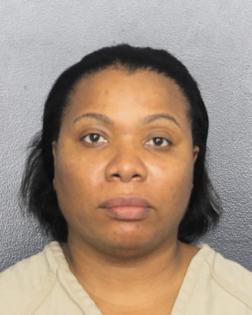Deonte's death: How did Florida, two health care agency nurses let a 7-year-old starve?
Published in News & Features
MIAMI -- As a patient of Florida’s once-admired health care program for the state’s sickest and most disabled children, Deonte Elijah Atwell was entitled to monthly visits from coordinators overseeing his care, sessions with physical therapists, specialists for his feeding tube and respiratory therapists to maintain his ventilator.
Instead, the state farmed Deonte’s care out to a private home health care company.
The company, in turn, was supposed to provide 24-hour nursing care, and to ensure the boy’s medical needs all were met. That didn’t happen, either. The agency took the state’s money, prosecutors say, and it reported visits that never took place. Home health nurses had outsourced their responsibilities to Deonte’s family.
Unable to speak, Deonte could not seek help when his mother and two other relatives simply stopped feeding him, prosecutors allege. And no help arrived, until too late. It was Christmas Day 2023 when paramedics encountered the boy — weighing one pound for each of his seven years. His shrunken body was marked by a gaping wound and a broken rib.
Barely alive, Deonte was already in rigor mortis, his skeleton visible through his skin. He would not live out the night.
“The system failed this child at multiple places on his journey,” said Dr. Jeffrey Goldhagen, a UF Health-Jacksonville professor and pediatrician who directs one of the largest centers in the nation for children with complex medical needs.
“It is critically important to understand that those failures began several years ago as Children’s Medical Services, a model program, was dismantled in favor of it becoming a contracted Medicaid managed care company.”
Though the investigation into Deonte’s Dec. 25, 2023, death focused on the boy’s mother and other relatives, detectives soon began asking questions about two registered nurses who were being paid by the state to provide home care to Deonte. He was born with spina bifida, a birth defect that occurs when a child’s spine doesn’t fully form during pregnancy, and encephalitis, an inflammation of the brain.
A case of neglect
How could a medically complex 7-year-old boy starve to death, authorities wondered, while under the care of a licensed home health agency, and state medical administrators?
This month, police and prosecutors began assessing the blame: They charged Deonte’s mother, Michelle Doe, and two other family members with homicide. They also charged the two registered nurses, who worked for a Miramar-based provider called Samaritan Home Health Agency, with a string of charges -- including first-degree murder for one of them.
But in a broader sense, Deonte may well have been a victim of Florida’s controversial, and long-litigated, approach to the care of children with profound disabilities and medical complexities. The cost of caring for such children can be so extreme – and the responsibilities so grave – that few, if any, parents are capable of shouldering them solely.
For decades, the parents of children like Deonte had only two choices, neither of them very good: institutionalize their children in nursing homes designed for elderly people nearing the end of their days, or depend upon home health care that – if parents were lucky enough to get it – often was unreliable. Parents have complained for years that nurses who were woefully underpaid often missed their shifts or abruptly quit in search of better-paying jobs.
Health care for children like Deonte who remained with their families often was overseen by a state program called Children’s Medical Services, a division of the Department of Health. For decades, CMS helped set the standard for pediatric critical care. But successive Florida governors and lawmakers rationed its budget and diminished its staff, then placed it in the hands of the state’s for-profit Medicaid managed care network in 2019.
Since August of 2022, the health department has left the position of CMS medical director vacant. “That speaks volumes,” said Dr. Louis St. Petery, a pediatric cardiologist who helped spearhead a successful lawsuit that accused the state of providing substandard medical care to impoverished children.
Three months before Deonte’s death, Dr. Jason Goldman, president of the Florida Medical Association’s board of governors, urged state Surgeon General Joseph Ladapo to fill the job. CMS, he wrote, “performs a tremendously valuable service for the children of Florida. Having a qualified deputy secretary appointed to lead CMS would be in the best interest of the division and would benefit all who depend on the programs that CMS operates.”
Nurses still licensed, for now
State oversight of children like Deonte doesn’t end with their death. The Department of Health also regulates doctors, nurses and other medical professionals. And though health administrators, the state Medicaid Fraud Control Unit and police had been aware of the two nurses’ involvement in Deonte’s life and — allegedly, death — the two are listed even now as professionals in good standing with the state, as has been the case since the boy’s death.
The license of Samaritan Health also remains active and unblemished with the state Agency for Health Care Administration, or AHCA.
On Friday afternoon, AHCA’s deputy chief of staff, Alecia Collins, issued a short statement in response to questions from the Herald: “The Agency cannot comment on specific cases due to...federal privacy laws. The Agency is in the process of revoking the [agency’s] license and is taking further necessary actions.”
The nurses, Mirlande Moltimer and Cassandre Lassegue, remain at the Broward County Jail, where they both are being detained without bond on charges of aggravated manslaughter, third degree murder, child neglect with great bodily harm and Medicaid fraud. Lassegue also faces first-degree murder charges.
Doe and Lassegue have pleaded not guilty. Moltimer’s plea is unclear from court records. Doe’s attorney, who works with the Broward Criminal Conflict Regional Counsel, could not be reached by a Herald reporter. Moltimer’s attorney did not reply to a reporter’s call. An attorney who may have been hired by Lassegue refused to confirm that representation, citing attorney-client privilege.
A Fort Lauderdale Police incident report suggests family members simply neglected to feed the boy, who was fed through a tube connected to his stomach. A search of the family’s modest home, at 1724 S.W. 11th Street, revealed a kitchen “stocked with food,” including nine unopened cases of the nutritional supplement that was to be poured into the boy’s gastrostomy tube.
The nurses, court filings show, are accused of billing the state for health care services they didn’t render. Last Monday, Broward prosecutors asked that Moltimer be held in jail until trial in a motion that detailed the state’s case against her. The pleading said Deonte “was subjected to prolonged food deprivation that was carried out systematically resulting in his death by starvation.”
“Clearly,” the pleading said, “had [Deonte] been receiving in-home skilled nursing in the days, weeks, and months leading up to his death, he would not have starved to death or have been subjected to severe medical neglect.”
State silent on role
The role of Florida health and child welfare administrators in the boy’s death is less clear, partly because the state won’t discuss it.
In its request to detain Moltimer, the State Attorney’s Office redacted a good bit of material. In explaining some of the information they withheld, prosecutors cited an exemption to the state’s public records law that protects “dependency matters, termination of parental rights, guardians ad litem, and child abuse [and] neglect” – matters that are overseen by the Department of Children & Families.
The Miami Herald asked a series of questions via email to leaders at three state agencies – the Department of Health, AHCA and DCF– on Tuesday. The health department has yet to respond.
DCF has not replied to questions regarding its role, if any, with Deonte’s family, and administrators have so far declined to provide any records it has generated about Deonte’s life and death, or to explain why. DCF investigates all child deaths in Florida.
Prosecutors’ request to detain Moltimer offers some disturbing clues.
Deonte had been under the care of Children’s Medical Services. His participation in the health care plan entitled him and his family to receive a host of services that, combined, were designed to ensure he received all necessary medical care. They included 24-hour home health care, medical daycare, physical, speech and occupational therapy, medical equipment, formula and supplies, respiratory therapists “to conduct monthly equipment assessments” and transportation to medical appointments.
Deonte’s family also should have had “a care coordinator to help navigate the health system [and] primary and back-up case managers to provide [the] family ongoing educational and monthly case management conferences,” the pleading said.
The court pleading doesn’t specify if all, or any, of those services actually were provided. But the professionals listed in the pleading would be legally required to report suspected maltreatment to the state’s child abuse hotline, so it is difficult, if not impossible, to imagine they worked with, or even saw, a child dying of starvation without reporting it.
The last documentation of Deonte’s weight came from a non-specified medical record in May of 2022, the pleading said, with the boy weighing 46 pounds. Nineteen months – and zero weight listings – later, Deonte weighed seven pounds at the morgue.
Tens of thousands in billings
Despite what he was entitled to receive from the state, the court record suggests Samaritan Home Health is all that stood between life and death for Deonte.
The agency was being paid by Florida Medicaid to supply 24-hour nursing care to Deonte, seven days-per week. Between September 2023 and January 2024 – the month after Deonte died – Samaritan “submitted falsified claims” or “fraudulent billing for services” that were “not rendered to the victim,” the court record said, totaling between $10,000 and $50,000.
Moltimer gave updates on Deonte’s health at monthly case management and care coordination meetings, where, the court record said, “CMS relied upon [her] to provide accurate information to ensure the victim’s comprehensive medical needs [were] met.
“Records and call logs show that [Moltimer] expressly denied any issues in providing 24/7 nursing care, she stated that there were no gaps in any of the shifts and that there were no issues or concerns with the victim.” Moltimer also wrote reports to Deonte’s primary-care pediatrician every 60 days “detailing all of the nursing services” delivered to the family, “despite having actual or constructive knowledge that services were not being provided,” the court record said.
Records generated by the investigation, the court pleading said, show Moltimer “engaged in a widespread scheme to defraud Medicaid and continues to have access to significant financial assets.”
It remains unclear whether CMS provided any oversight of Deonte’s care, other than paying for nurses that prosecutors say did not show up.
Unused equipment, unopened food
The police report into Deonte’s death doesn’t detail the child’s disabilities, except to say he suffered from “numerous severe medical issues” in addition to his spina bifida.
That Christmas Day, paramedics were called to Doe’s home to treat a child who was “sick and on a respirator,” police wrote. But emergency workers encountered an unspecified “disturbance” at the house, and asked for help from police. An officer found Doe “cradling” her child, who was still connected to a ventilator in his neck.
The 10-minute 911 call – which includes a sobbing Michelle Doe, as well as shouting and cursing by relatives – had been made by a man who identified himself as Deonte’s uncle. “My nephew, he’s on a [ventilator], he’s not responding too well now,” the caller said. “Can you please just send a truck, please, Ma’am. I’m begging you.”
Police reported that Deonte’s “bone structure was showing,” and “he appeared to be extremely fragile.” Paramedics drove Deonte, still in his mother’s arms and attached to the ventilator, to the hospital, where he was pronounced dead.
Goldhagen, the UF pediatrician, has seen the consequences of malnutrition and starvation: “This child died a horrifying death,” he said. “It’s very conceivable this child was starved over time for months before he succumbed to the starvation.
“It is difficult to imagine the discomfort, the pain and what this child went through during this starvation, which is, in fact, a form of torture.”
One officer described Doe’s house as “dirty and disheveled.” “The refrigerator, freezer and cabinets were stocked with food,” the report said, including 216 unopened cans of formula that could have been used to keep Deonte alive.
“The bedroom in which the decedent was cared for [was] in disarray with piles of clothing and shoes scattered about. There were cords stretched across the floor and furniture stacked on top of each other,” the report said.
“There was a suitcase on the bed which was full of medical equipment,” including a feeding pump, tubes and a humidifier that appeared to be contaminated – as was a suction machine for the ventilator. “There was a home oxygen concentrator on top of a nightstand with a tube entangled in clothing.”
Detectives later were called by Broward Medical Center staff, who became alarmed at Deonte’s “severe malnutrition” when they encountered him in the emergency department.
Two weeks after her son’s death, Doe created a GoFundMe page seeking contributions to defray the costs of his funeral. “Christmas Day my baby son passed away at the age of 7 due to his birth defects,” she wrote. “His life was a challenge [and] I am asking for help to lay him to rest.” She appears to have raised $500.
Troubling state record
Deonte was by no means the first severely disabled child to die while, on paper at least, receiving care from the state.
On Sept. 25, 2013, a 12-year-old foster child, Tamiyah Audain, was found dead in her bed, the victim of severe malnutrition and systemic infection. Tamiyah had been living with a cousin under the supervision of ChildNet, the Broward foster care agency under contract with the state. She had lost more than half her body weight, and one bedsore had grown so deep that a bone in her pelvis was visible.
Two psychologists and a ChildNet worker were indicted in Tamiyah’s death, though the charges against the psychologists were dropped a month later. The foster care worker, who had been charged with aggravated child abuse, pleaded no contest, and was sentenced to five years probation in 2016.
In November 2018, Samayah Anne Emmanuel, who was also 7, died of malnutrition after being adopted by a nurse in whose care DCF placed her. She also had “shriveled away,” with her bones protruding from her body. Reports suggested Samayah had been tortured in her final months – burned, beaten and forced to drink bleach.
Even after DCF had confirmed a report that Samayah had been profoundly abused by her adoptive mother, Gina Emmanuel, then a registered nurse, a sister department, the Agency for Persons with Disabilities, declined for more than a year to shut down a group home Emmanuel operated for people with disabilities. Emmanuel’s nursing license likewise remained active a year after her daughter died.
The state acted a year later, after Emmanuel was arrested on Oct. 15, 2019, charged with three counts of aggravated child abuse, child neglect and psychological abuse.
Florida health administrators have defended the state’s policies and actions toward children with medical complexities and disabilities, including in a series of lawsuits filed by doctors’ groups and children’s advocates seeking improved care.
On New Year’s Eve, 2014, U.S. Circuit Judge Adalberto Jordan ordered the state to improve care for impoverished Florida children, saying in a 153-page order that lawmakers had for years set the state’s Medicaid budget at an artificially low level, causing pediatricians and other specialists for children to opt out of the insurance program for the needy.
And, in July of last year, U.S. District Judge Donald Middlebrooks ordered state health administrators to cease relying on institutions for the care of fragile children. In a scathing order, Middlebrooks wrote that the state’s long-standing failure to provide adequate care to children with complex medical needs had resulted in the “tragic” and illegal warehousing of fragile children in institutions.
©2024 Miami Herald. Visit at miamiherald.com. Distributed by Tribune Content Agency, LLC.












Comments